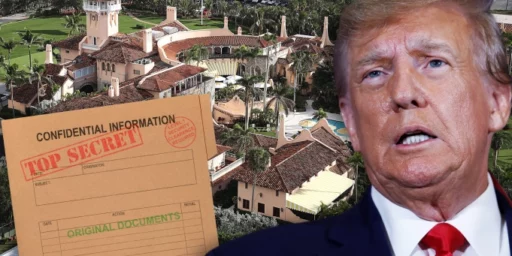Obama Supports Warrantless Searches
The Obama administration wants the FBI to be able to look at your Internet records without the inconvenience of respecting your 4th Amendment rights.
“You know, if I’d wanted Dick Cheney as president I would have just voted for him.” – Kevin Drum
The 4th Amendment’s requirement that “no Warrants shall issue, but upon probable cause, supported by Oath or affirmation, and particularly describing the place to be searched, and the persons or things to be seize” is really a nuisance, the Obama administration argues.
The Obama administration is seeking to make it easier for the FBI to compel companies to turn over records of an individual’s Internet activity without a court order if agents deem the information relevant to a terrorism or intelligence investigation.
The administration wants to add just four words — “electronic communication transactional records” — to a list of items that the law says the FBI may demand without a judge’s approval. Government lawyers say this category of information includes the addresses to which an Internet user sends e-mail; the times and dates e-mail was sent and received; and possibly a user’s browser history. It does not include, the lawyers hasten to point out, the “content” of e-mail or other Internet communication.
But what officials portray as a technical clarification designed to remedy a legal ambiguity strikes industry lawyers and privacy advocates as an expansion of the power the government wields through so-called national security letters. These missives, which can be issued by an FBI field office on its own authority, require the recipient to provide the requested information and to keep the request secret. They are the mechanism the government would use to obtain the electronic records.
[…]
The use of the national security letters to obtain personal data on Americans has prompted concern. The Justice Department issued 192,500 national security letters from 2003 to 2006, according to a 2008 inspector general report, which did not indicate how many were demands for Internet records. A 2007 IG report found numerous possible violations of FBI regulations, including the issuance of NSLs without having an approved investigation to justify the request. In two cases, the report found, agents used NSLs to request content information “not permitted by the [surveillance] statute.”
One issue with both the proposal and the current law is that the phrase “electronic communication transactional records” is not defined anywhere in statute. “Our biggest concern is that an expanded NSL power might be used to obtain Internet search queries and Web histories detailing every Web site visited and every file downloaded,” said Kevin Bankston, a senior staff attorney with the Electronic Frontier Foundation, which has sued AT&T for assisting the Bush administration’s warrantless surveillance program.
I understand any administration’s or agency’s desire to accumulate more power — after all, they’re decent folk who just want what’s best for the country. But I don’t get how this passes judicial scrutiny.
While I’ve got a strong libertarian streak and am staunchly protective of our rights under the Constitution, I’m not an absolutist. Even our most fundamental liberties, such as freedom of speech and assembly, have to be balanced against the rights of others and the need for public safety.
During the Bush administration, I defended the idea that the government ought to be able to conduct data mining operations on mass communications with persons of interest overseas. My rationale was that this wasn’t a “search” in any meaningful sense because it was just computer algorithms sifting through impersonal information, that there would be no way to show probable cause ahead of time, the targets were overseas operatives, and that the purpose was intelligence gathering rather than prosecution. So, the harm to individual liberty was small and mostly theoretical while the potential harm to society from not gathering the information was substantial.
But this is something quite different: Specific searches of activities carried on by specific American citizens domestically. Further, it’s not like the records are going anywhere, making seeking out a magistrate and getting a proper warrant a minor burden. So there’s no reason that a warrant can’t be obtained and no additional risk to society by going through the process required by the Constitution outside the ones intended by the Framers.
Prioritizing law enforcement over civil liberties is hardly something unique to the Obama administration or Democrats. This is merely another step down a road we’ve been traveling for a while. But it’s time to walk this back.







Agree with both Drum’s quote and JJ’s post.
Wait, I was clear that the Bush administration was not limiting their search to people overseas. I think you are suggesting a move “in practice” when this is more likely “catch up” to practices in place.
I do think we should “roll back,” but I think this is more an attempt to legalize things already quietly done.
Totally agree. The problem of course is when you create a vast security network as described in that series of articles in the Post these things take on a life of their own. I’m amazed that Post series didn’t garner more comment because relative to the Wiki leak it was massively more disturbing. It was truly Kafka esque in its extent and complexity. Basically Panetta and Gates admitted it’s out of control. I’m sure you’re familiar with the expression life imitates art. Well how many movies have we seen where our totally blameless hero is being pursued by mysterious govt agencies.
I really, truly wish that there was a meaningful choice in elections on civil liberties issues.
This is facially unconstitutional. Obama is a constitutional scholar. Perhaps the two are related?
Getting this “expansion” invalidated – on the record – would actually go some length in limiting the powers of a successor. It wouldn’t be the first time the government sandbagged a case in order to make new law through the courts.
Then your beef is with the National Security Letter program as a whole, not this expansion of it. NSLs are ripe for abuse because (a) there is no judge involved at all and (b) the target of the search is never informed of it and the business which receives the NSL is under a permanent (!) gag order never to disclose it.
However, there is longstanding precedent that business records of your dealings with that business deserve less protection than, say, your “person, house, papers and effects.” Cops can go into a business and demand sales information to see if anyone bought bomb-making materials, for example, and they don’t need a warrant, they just need the business owner’s consent. This is because the records belong to the business and the individual customer has no reasonable expectation that others will not know the content of those records, since he or she knows the employees of the business have access to those records.
So, I don’t think it’s reasonable to have a warrant requirement for business records searches, but I think there should be a tighter standard on these investigations. The most important thing is the secrecy. There should be a presumption that the target of the NSL should be notified of it and the recipient of an NSL should be free to speak about it, unless the government can show a (presumably, FISA) judge compelling evidence to the contrary.
Sounds like a pen register. If it’s closer to that than to wiretapping, it shouldn’t be unconstitutional. I’m looking forward to Orin Kerr’s take.
***Prioritizing law enforcement over civil liberties is hardly something unique to the Obama administration or Democrats. This is merely another step down a road we’ve been traveling for a while. But it’s time to walk this back.***
Back before the election James, you said (repeatedly) that Obama would fight to keep the excesses of the Bush administration and probably try to expand them. I disagreed, To say that I was naive is putting it lightly. Every time Obama has had a chance to surrender some of these “powers” he has fought to strengthen the hold the POTUS has on them.
“I really, truly wish that there was a meaningful choice in elections on civil liberties issues.”
Agreed. The money I send to the ACLU seems well spent again.
” I’m looking forward to Orin Kerr’s take.”
You beat me to it.
While amusing IMO Kevin’s wisecrack is an exaggeration. Relate this to Alex’s comment above. In the absence of a meaningful difference between the Republican and Democratic candidates in this matter what would Kevin have done? Sit out the election?
No, IMO he’d’ve held his nose and voted Democratic anyway.
Human nature dictates that any administration will test the range of its powers. If there were a serious commitment to civil rights, our move would be to proscribe those powers further. I interpret our failure to do so as the absence of a serious commitment to civil liberties.